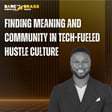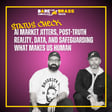
So, Are We Gonna Cure Cancer or Just Double Down on Mining Attention?
This week George K and George A switch formats to tackle the AI revolution's messiest questions—from autonomous coding agents to digital actresses and deepfake scams.
The hosts examine what happens when innovation moves faster than ethics. When Claude Sonnet 4.5 promises 30 hours of autonomous coding, what's the real trade-off between productivity gains and security fundamentals? When talent agencies want to represent AI-generated actresses, are we witnessing the death of human performance art or just another moral panic? And when Brazilian scammers can steal millions in $19 increments using celebrity deepfakes, who bears responsibility—the platforms, the regulators, or the users?
They explore the uncomfortable economics behind AI video generation, where companies promised to cure cancer but instead delivered infinite dopamine-mining slop. The conversation digs into data center energy consumption, the exploitation of human attention, and why your grandmother clicking Facebook ads might represent democracy's newest vulnerability.
George A brings a practitioner's lens to AI governance, arguing for education from elementary school up, metadata standards for content authenticity, and balanced regulation that protects innovation without enabling exploitation. George K challenges the fundamental premise: if supercomputers are being pointed at our dopamine receptors just to sell more ads, what happened to building technology that actually improves human life?
Most importantly, they ask: Are we building applications that create a better future, or are we just doubling down on the attention economy?
News examined:



















